#openprocessing
Explore tagged Tumblr posts
Text
26 notes
·
View notes
Text
ちょっと光らせてみた。ランダムに選んだアルファベット1文字を回転対称操作してタイリング。
4 notes
·
View notes
Text
Planet Brubeck Clock
Assignment: Make a "clock for aliens" using processing.exe
Imagine a planet that runs on brubeck time. That's right, quintuples baby. I wanted to make a sequencer animation vaugely based on the quartet instrumentation in "Take Five". First I took a look at the sheet music for each part and jotted down how many hits were in each bar for each instrument.
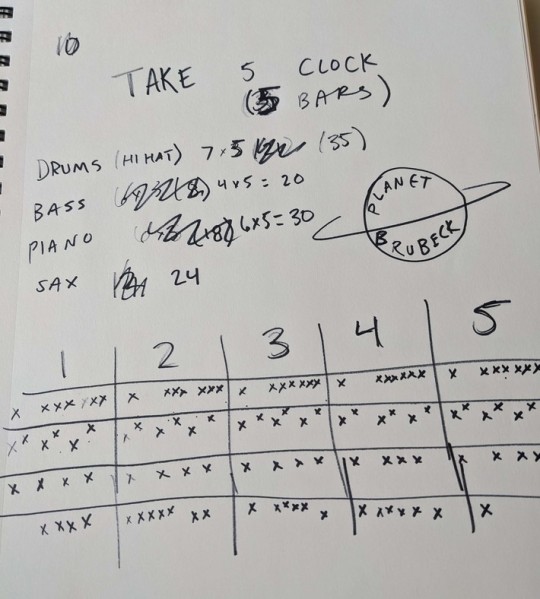
Note that I decided to focus only on the hihat for the drums because you could build a whole other program solely on sequencing the entire drum kit. I wrote down five bars here even though that's more than the proper measure... I fixed this later in the program.
Okay, time to get to coding work. First I started out making a nice grid & color scheme.
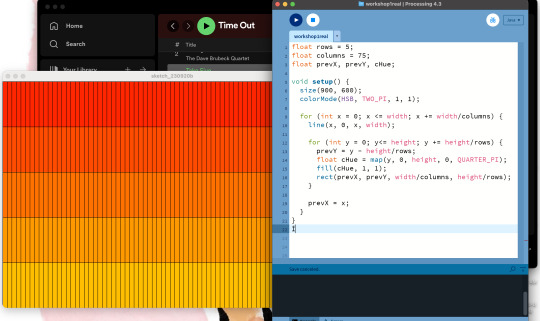
Nested "for" loops, we love em.
Each bar I would have representing an instrument, with the top bar representing the measure. I wanted rectangles to appear that would syncronize with the song (as best as I could without proper, jazzy delays). First I had to make some rectangles.
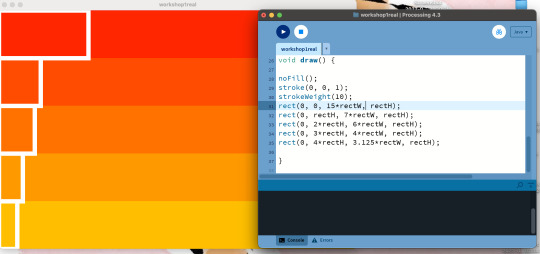
Werk!!
Each rectangle is based off the smaller rectangles in the original grid, henve the rectangle widths being things like 15 * rectW, where rectW is width (of the window) / 60.
Now came the tricky part, which was making multiple rectangles for each bar that would blink across the screen in time with the music.
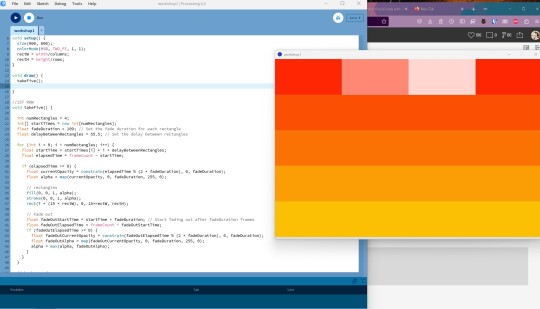
The solution to making multiple rectangles all the way across was another for loop. I understood that to make each rectangle appear and then fade out, I would have to draw the background OVER each rectangle over and over again with an alpha channel creating the fade effect; hence, a nested for loop with the code for the background I wrote first.
The trickiest part was figuring out the timing; when I first wrote the for loop all the rectangles would activate and fade out at the same time. I realized I needed to index each rectangle so I could give them each their own start time as well as a flexible "fade duration" that would allow me to finesse the timing of each loop as much as possible. I thought about using millis() for my timekeeping factors but decided not to overcomplicate things and just stick with frameCount. I bet using millis() and maybe even seconds() might help create more jazzy patterns but... that's hard.
After perfecting the code for the first row(representing four measures, since it is 5 beats over 4 bars, after all), I moved on to the second row.
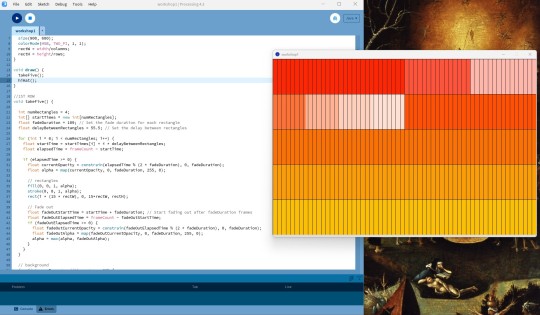
Figuring out how to get the rectangles to fade was the trickiest part, so once that was done it was just a matter of personalizing each row and changing the overall visual style. Writing each row as its own function seemed the easiest way to go to stay organized rather than dumping all the code in the draw() function. I decided to show the grid in the end because I thought it gave the program a more analog look.
The only variables I had to play with when creating each function were the y-position and the width of the rectangles, and the fadeDuration and delayBetweenRectangles to get the timing right, the rest of the function (the opacity and the background) working across all functions.
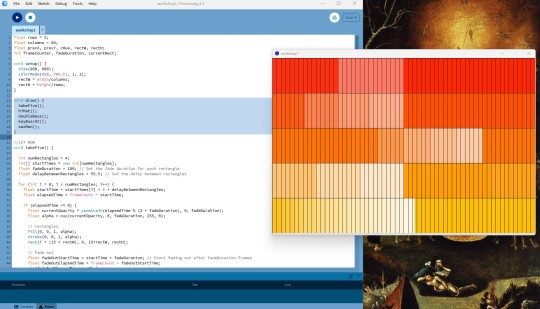
Et voila! My Brubeck Clock. Again, with some extra finessing with the time functions, I bet I could make each rectangle sync up with each note played on the saxaphone, for example. However I wouldn't really know where to begin or end with trying to mathmetize jazz music. Math rock, maybe....
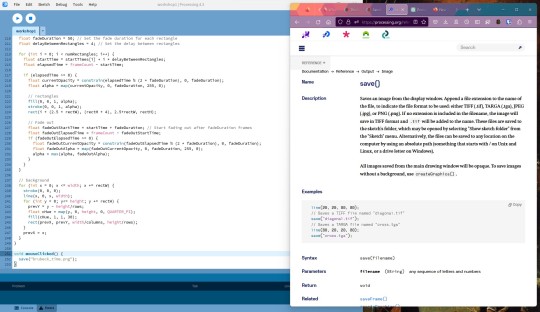
The last function I wanted to deploy was one where it would save a picture of the screen upon click. As we look at the hands of a clock to tell our time, on Planet Bruebeck, the position of each beat in the five bars is how they tell their time. Oh look, it's 2nd Measure, C7, D12, A#, Closed Hat.... o'clock!
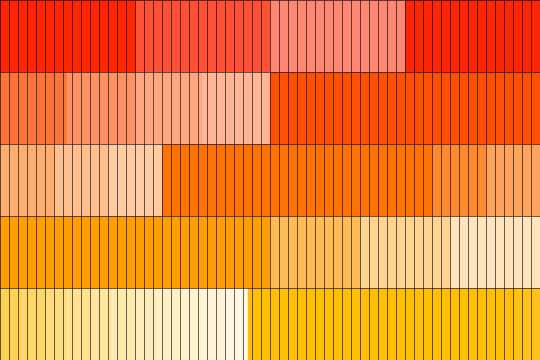
Tried to upload it to openprocessing, a website that seems to hate me because I can never get my animations to show up right. However, if you take the code from there and pop it in processing yourself, it should work swimmingly! Try watching with Take Five on... it's pretty close, I think.
Thank you and enjoy.
0 notes
Note
https://openprocessing.org/sketch/495901/
This was the link on a post I saw a day or so ago that I was worried was a rick roll at first.
I was happy to be wrong about it
6 notes
·
View notes
Text
4 notes
·
View notes
Text
Week #3
Introduction
For this week I knew I needed to spend a little time narrowing down what I wanted my topic to be. Next week I plan on spending most of my time on that task but I still need to do some thinking now because I’m at a point where I’m encountering recurring issues:
Issue #1: I know I want to do something personal relating to finding one’s identity and how hard that can be growing up when you feel othered or like you don’t belong. I just don’t know if I want to use the lens of nostalgia, horror, or both to convey feelings of discomfort? I’ve enjoyed the research I’ve done but I just don’t feel totally set on that yet even though I spent the last two weeks largely looking into it.
Issue #2: I haven’t seen a lot of horror? It’s a genreI stayed away from for so long, and it’s only been a recent thing that I’ve felt like I want to explore more and I feel drawn to, but I'm not knowledgeable on the subject so I need to decide if I want to pivot off of this or not. I think the form of horror I’ve consumed the most is through video games so I could spend a week diving into that.
I am hoping my research this week leads me in the right direction.
Research
I sent out a google form this week asking questions related to horror/thriller genres in media people consumed growing up and how they might have been affected by them. I also wanted to know why people really like these genres or why not.
Do you consume media (games, films, TV, books, videos) containing horror/psychological/thriller elements?
When you were a teen/preteen, what were some of the memorable pieces of media in those genres that you consumed?
Are you drawn to these genres? Why or why not?
Do you remember any media in these genres being particularly nostalgic for you?
Are you easily scared or frightened? Did/do you have a lot of nightmares often now or when you were younger?
I sent this out on monday to some friends and as of writing my blog post I’ve gotten 8 responses. There is a wide variety of answers which I’m very happy about. I found it interesting that I had responses in all 4 quadrants of this table.
Enjoys horror and gets scared easily
Doesn’t enjoy horror and attributes that to getting scared easily
Enjoys horror and isn’t scared easily
Doesn’t enjoy horror and isn’t scared easily
The question about nightmares led to some interesting thought processes and I might look into that more. Like I had one person say that they are super anxious and got a lot of nightmares as a kid but don’t like horror not because it’s scary but because they find a lot of it to be “cheesy”. Another person said they have to watch horror media during the day which I definitely relate to. It reminded me though how the dark is an extra layer of scariness because of the unknown that comes with not being able to see your surroundings well.
Overall there’s a lot more that I learned from the responses so far and I think it helps me find some more things to look into as potential points of views surrounding maybe the eyes and identity or nightmares and identity etc.
Creative Research
One of my friends had mentioned I should look into OpenProcessing, which is an online platform that allows people to share and explore creative coding projects made with p5.js and other programming languages. It's like a social network for artists and programmers, where you can find, showcase, and collaborate on interactive artworks and visual experiments. I just started learning JavaScript and using the p5 library this year and the generative art side of the website drew me in.
Some examples of cool things that I was looking into on the website:
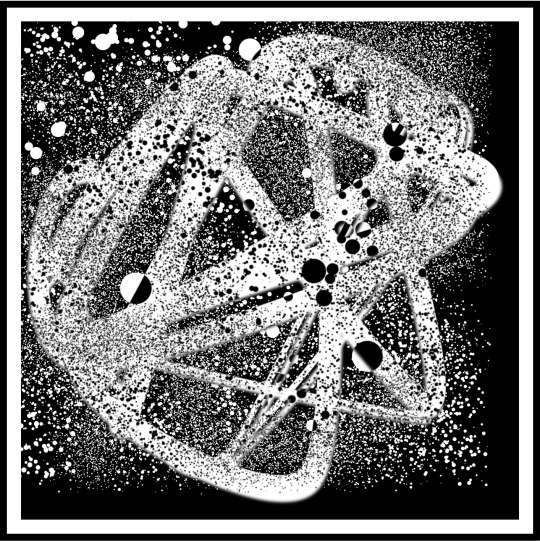
https://openprocessing.org/sketch/1270210
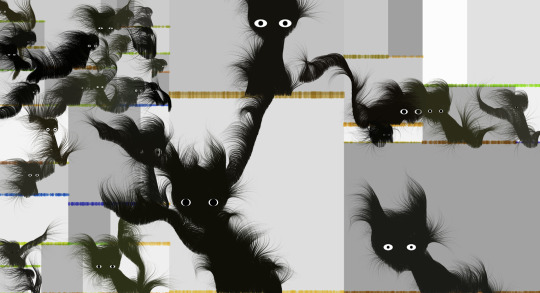
https://openprocessing.org/sketch/2065676
https://openprocessing.org/sketch/2095152
Over the week I ended up looking into tutorials on the basics of making sketches. This one guy has a good series on different topics like shapes, loops, color, trig functions, noise. I just spent time learning more about generative art and I think these skills can help me in the future of wherever I head in my project.
youtube
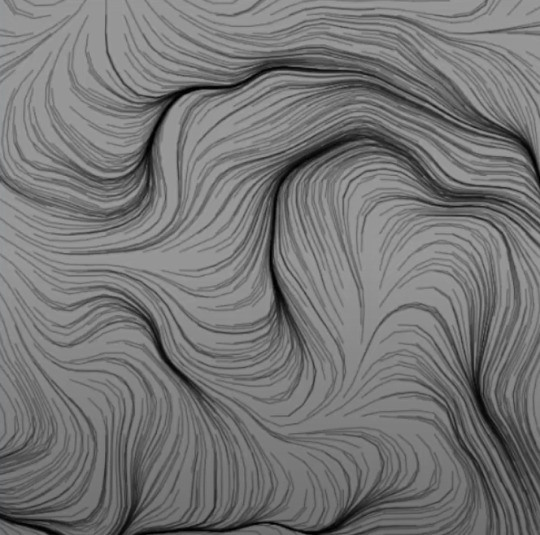
Reflections
This week I think I gained some good insights. I know I want to work with identity and research something related to that pain and discomfort that comes with trying to find your identity, especially growing up in the preteen and teenage years. My creative research was not connected really to my reflection but I do think I will use what I learned in the future of my project. I know for next week I will continue to expand upon what we worked on in class with identifying a point of view and I have some really good ideas I just need to look for gaps in information now.
2 notes
·
View notes
Text
first time making....well any sort of game thingy
2 notes
·
View notes
Text
Generative Art/Creating Art With Code/p5.js Masterlist
#creative coding#generative art#p5js#p5.js#javascript#coding#open processing#tech#technology#masterlist#creating art with code#informative#educational#artists on tumblr
0 notes
Text
Exploring slope fields with
@dandersod
’s applet:
Link: https://openprocessing.org/sketch/1200971
#slopefield #eulersmethod #ode #iteachmaths #ilovemaths 😃🌈🤩
@openprocessing
@ProcessingOrg
https://x.com/jcponcemath/status/1685392995741577216
0 notes
Text
In the vast landscape of global entrepreneurship, few stories stand out as uniquely inspiring as Ilya Manin’s. Born in St. Petersburg, Russia, Ilya’s journey to success is a testament to perseverance, resilience, and a relentless pursuit of personal and professional growth.
0 notes
Text
ちょっと光らせてみた。ランダムに選んだアルファベット1文字を回転対称操作してタイリング。
2 notes
·
View notes
Text
Jane Jensen is an American video game designer and author. She is mostly known as the creator of the Gabriel Knight series of adventure games, and also co-founded Oberon Media and Pinkerton Road video game development companies.
0 notes
Text
3 notes
·
View notes
Text
¡PUEBAS DE PROYECTO FINAL!
Pare este proyecto final me propuse la creación de un código de programación que pueda formar rostros semi-realistas a través de partículas de color. He tenido avances cruciales, mismos que pueden ser visualizados en el siguiente link:
Aquí encontramos tres avances importantes, y aunque son pruebas, se encuentran las funciones y acciones para esta pieza de arte interactiva. Hoy se hizo la tercer prueba, pero seguiremos trabajando en el desarrollo del código para crear algo increíble. :)!
0 notes
Text
Top 10 Must-Visit Websites for Learning New Skills
In today's rapidly evolving world, continuous learning is crucial for both personal and professional development. The internet offers a vast array of resources, but identifying the best ones can be challenging. To assist you on your learning journey, we've compiled a list of the top 10 must-visit websites that provide excellent opportunities to acquire new skills. Each site offers unique tools and content to enrich your knowledge and enhance your abilities.
1. Desks Near Me
Desks Near Me is an excellent platform for those aiming to boost their productivity and collaboration skills. This website connects you with co-working spaces worldwide, enabling you to find the ideal environment for your projects. Working alongside other driven individuals allows you to exchange ideas, gain new perspectives, and cultivate a culture of continuous learning.
2. Kuula
Kuula is a top platform for learning and creating 360-degree virtual tours. It's particularly beneficial for photographers, real estate agents, and educators wanting to create immersive experiences. Kuula provides user-friendly tools and a supportive community to help you master virtual tour creation, enhancing your digital media skills.
3. Payhip
Payhip is a fantastic resource for entrepreneurs and creatives looking to monetize their skills. This platform allows you to sell digital products, such as e-books, courses, and software. With Payhip, you can learn to create and market your products effectively, developing essential business and marketing skills that can advance your career.
4. Western City Jobs
Western City Jobs is invaluable for those seeking to enhance their career development skills. It offers a wealth of resources for job seekers, including resume building tips, interview preparation guides, and networking strategies. Utilizing the tools on Western City Jobs can boost your job search skills and improve your chances of securing your dream job.
5. Open Library
Open Library is a digital library providing access to millions of books across various genres and subjects. This platform is perfect for lifelong learners who love reading. You can explore literature, science, technology, and more, broadening your knowledge base and improving your research skills. Open Library's extensive collection makes it easy to find books that cater to your interests and educational needs.
6. JustPaste.it
JustPaste.it is a simple yet powerful tool for content creation and sharing. It allows you to write and publish articles, notes, and other written materials quickly. This platform is ideal for writers, bloggers, and educators looking to improve their writing and communication skills. JustPaste.it's intuitive interface and easy sharing options make it a go-to resource for honing your content creation abilities.
7. OpenProcessing
OpenProcessing is a creative coding platform where you can learn and share interactive visualizations. It's an excellent resource for artists, designers, and programmers interested in exploring the intersection of art and technology. OpenProcessing offers tutorials, projects, and a community of like-minded individuals to help you develop your coding skills and create stunning visual art.
8. Share My Lesson
Share My Lesson is a comprehensive resource for educators and lifelong learners. It provides access to thousands of lesson plans, teaching materials, and professional development resources. Whether you're a teacher looking to enhance your classroom strategies or a student seeking additional learning materials, Share My Lesson offers valuable content to support your educational journey.
9. MagCloud
MagCloud is a self-publishing platform that allows you to create and distribute print and digital magazines, catalogs, and books. This site is perfect for aspiring publishers and content creators looking to develop their design and publishing skills. MagCloud's user-friendly tools and templates make it easy to produce professional-quality publications, helping you bring your creative visions to life.
10. Super Sadovnik
Super Sadovnik is a gardening website offering a wealth of information on horticulture and landscaping. It's an excellent resource for gardening enthusiasts and professionals looking to expand their knowledge. The site features articles, tutorials, and forums where you can learn about plant care, garden design, and sustainable practices, enhancing your gardening skills and fostering a deeper connection with nature.
In conclusion, these ten websites provide invaluable resources for anyone looking to learn new skills. Whether you're interested in improving your productivity, mastering digital media, developing business acumen, or exploring creative coding, these platforms offer the tools and communities you need to succeed. Embrace the opportunities they provide and take your personal and professional development to the next level.
0 notes